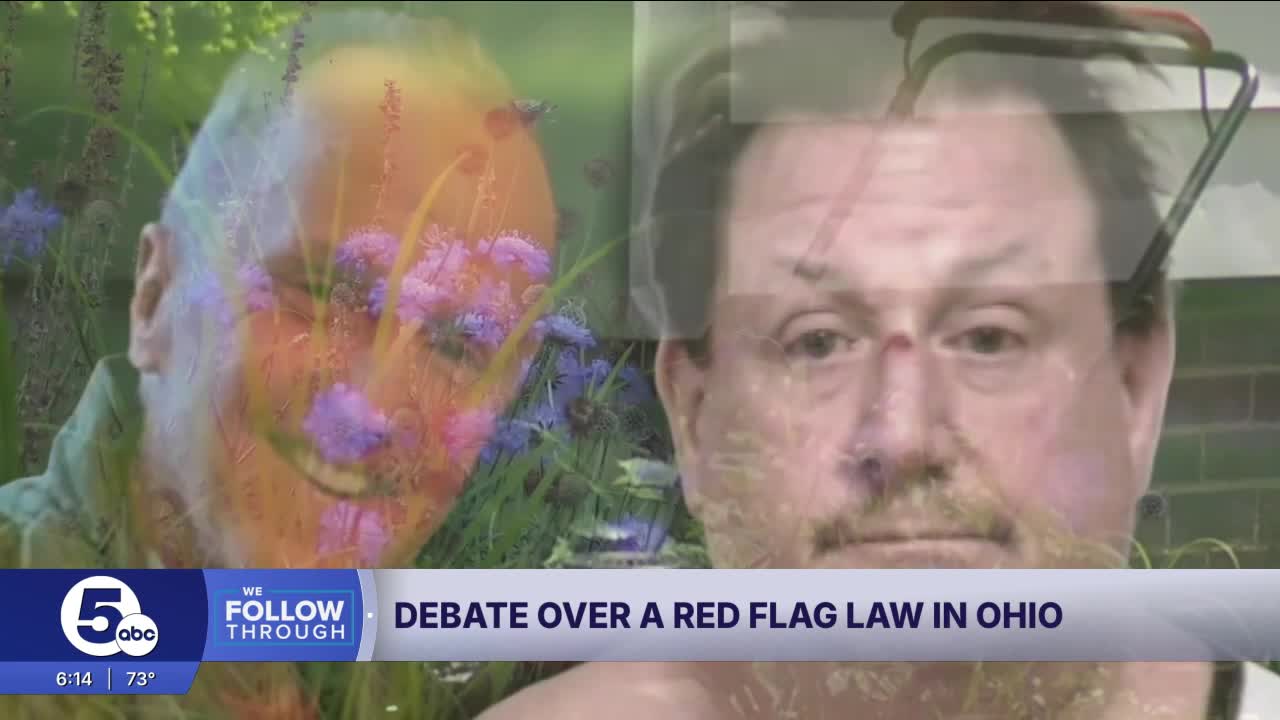CLEVELAND — Bryan Hurt was more than a nuisance to his neighbors.
"He was a bully who just preyed on everyone," Debbie Orlosky said. "It was scary."
"We were all kind of watching out for each other," said Jacob Speelman.
Hurt's bizarre behavior brought police to his home on Munn Road more than 60 times over the last five years, according to Cleveland police records.
"He would take pictures of houses. He would block people’s cars so you couldn’t get in. He would pull out of his driveway and lay on the horn and wake everyone up," Orlosky said.
Neighbors suspected he was dangerous, but none of them knew he had a gun.
Then, on a warm spring day, police said Hurt's next door neighbor, Thomas Overall, 68, decided to cut his grass.
Neighbors said, for some reason, Hurt would often become angry when Overall mowed his lawn.
This time, Cleveland police said Hurt shot and killed his next-door neighbor, Overall, before driving to Rocky River Reservation and taking his own life:
"Something should have been done," Orlosky said. "And it wasn’t."
Red Flag laws
"It's unnerving," said Ohio Rep. Bride Rose Sweeney (D-Westlake).
Sweeney represents the West Park neighborhood where Hurt murdered Overall.
She also grew up there.
"It doesn't have to be this way," she said.
Sweeney has long supported the use of Extreme Risk Protection Orders (ERPOs), also known as "red flag laws."
When there is evidence a person is a risk to themselves or others, a judge can issue an order prohibiting the person from possessing or purchasing firearms for the duration of the order.
In most jurisdictions, it's up to one year.
Law enforcement, family members, or health care professionals can petition the judge to issue the order if there is proof that the person intends to commit suicide or homicide.
In some states, law enforcement can then search the person's home for guns.
Red flag laws have been passed in 21 states, including Florida and Indiana, as well as the District of Columbia and the U.S. Virgin Islands.

"If someone is showing signs or risk factors for suicidality or homicidality, you create some space and time between them and firearms to reduce the risk," said Spencer Cantrell, Assistant Scientist at the Johns Hopkins Bloomberg School of Public Health and Co-Lead at the National ERPO Resource Center at the Johns Hopkins Center for Gun Violence Solutions.
Cantrell said research shows red flag laws reduce suicides and homicides.
"Nationally, research shows that for every 17 to 23 ERPOS issued, one suicide is prevented,' she said. "So, we know that these are effective."
"I can think of so many examples from around the country where ERPOS have been used in a variety of circumstances to prevent suicides, preventing people from possessing firearms who were threatening elected officials or political violence, threatening law enforcement, in domestic violence cases, where a victim didn’t feel safe going forward and reporting their abuser," she said.
Opposition in Ohio
However, it is unlikely a red flag law will get a green light in Ohio anytime soon.
When Sweeney introduced a red flag law in 2019, it went nowhere.
A similar law introduced this legislative session has languished in committee.
Ohio Attorney Dave Yost has also voiced his opposition to red flag laws.
The Buckeye Firearms Association, an Ohio gun rights lobbying group, says red flag laws violate gun owners' rights.
"They basically accuse you of something, and you're punished, essentially, before you are able to defend yourself in court," said Dean Rieck, Executive Director of the Buckeye Firearms Association.
"The firearms are seized and then you go to court to figure out if the right thing was done," he said. "That’s backwards."
"We don’t want dangerous people to have firearms more than anyone else," Rieck said. "It’s the process that’s important. If you’re going to take away someone’s firearms, there needs to be proof from professionals that there’s actually a reason for doing that."
"It’s not enough just to have a police officer go to a judge who’s likely to agree with the police officer because that’s the way the system works," he said. "If you’re saying this person is mentally incompetent to have firearms, you should have proof of it and only a medical professional can provide that proof."
'It could have been prevented'
From Overall's hometown in Farmington, Missouri, Overall's niece, Whitney Schaaf, has wondered if her uncle's murder could have been prevented.
After all, as a convicted felon, Hurt was already banned from owning a gun.
"I can see the importance of states having those types of (red flag) laws in place, to possibly prevent tragedies like this," said Schaff.
"It's just really sad to see that, you know, this possibly fell through the cracks," she said.
For years, she said her family heard stories about Overall's next-door neighbor.
Schaff said that when Cleveland police called her aunt to inform her about Overall's death, she immediately suspected Bryan Hurt.
Said Schaff: "When my aunt first heard it from the Cleveland detective that she talked to on the phone, the first words out of her mouth was, 'Was it his neighbor'?”




